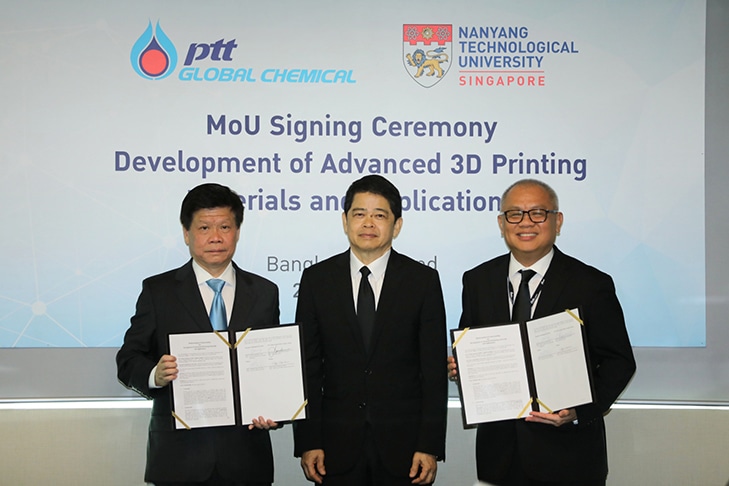Jun 21 2017
Researchers from Nanyang Technological University, Singapore (NTU Singapore) and Thailand’s PTT Global Chemical (PTTGC) will join together to develop advanced 3D printing materials for the next-generation automotive sector.
 Credit: NTU, Singapore
Credit: NTU, Singapore
PTTGC is the largest petrochemical and refining company in Thailand. With eight major business lines, it focuses on investing into the development of green chemicals and speciality chemical products.
A top-ranked University, NTU is well-known for its research-intensive interdisciplinary approach in creating ground-breaking solutions for industry and society.
NTU and PTTGC aim to cooperatively develop new materials that could be used to 3D print vehicle components to enhance fuel efficiency and decrease carbon dioxide emissions, nurturing sustainable growth.
Today, the two partners signed a Memorandum of Understanding in Bangkok, Thailand.
This partnership is very timely, especially when many countries are developing advanced manufacturing technologies to make more complex components, yet with a greener carbon footprint. With the combined expertise of NTU in translational research and innovation, and the industrial application experience of PTTGC, I am sure that together we will be able to achieve new technological innovations and scientific breakthroughs.
Professor Lam Khin Yong, Chief of Staff and Vice President (Research)
Signing on behalf of PTTGC is Mr Supattanapong Punmeechaow, President & Chief Executive Officer. “Our company is leveraging its research and development competencies as one strategic arm for growth and sustainability. Thus, we collaborate with both domestic and international external partners to attain timely commercialisation. Under the current Thailand 4.0 Policy, Thailand is moving towards an innovation-driven economy. Both PTTGC and NTU Singapore have mutual interests and complementary strengths, creating synergy for faster innovation.”
The two partners signed a research collaboration agreement on the same day that details the research focus.
NTU has built up its expertise in 3D printing in recent years, partnering industry leaders to create state-of-the-art technologies in major sectors such as defense and aerospace, where it is finding more reliable approaches for 3D printing aerospace components and is creating lightweight UAVs with embedded electronics.
In healthcare, the University is formulating new techniques of 3D printing medical implants and human tissue, while in the marine and offshore sector it aims to create 3D printing solutions to make it cheaper and easier to repair components of rigs and ships. The University is also keen on increasing productivity in the building and construction industry, where it aims to discover new ways to 3D print customized concrete structures for buildings.
Professor Chua Chee Kai, Executive Director of NTU’s Singapore Centre for 3D Printing, is also one of the most well cited Scientists in the world for 3D printing.